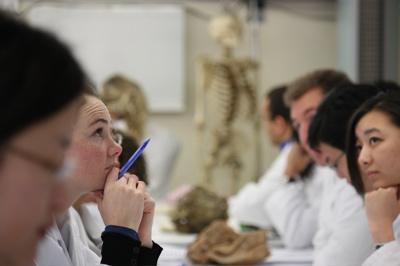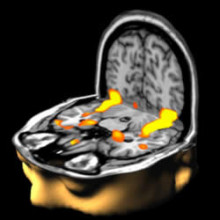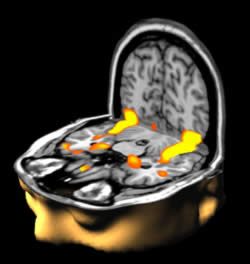Why are some psychiatric illnesses, like anxiety and depression, on the increase? Could conditions, like attention deficit hyperactivity disorder, or ADHD, confer an evolutionary advantage? And is it ethical to screen babies for future brain disorders?
In this episode

00:00 - At Risk of Mental Illness?
At Risk of Mental Illness?
with Professor Barbara Sahakian, Cambridge University, Professor Michael Owen, Cardiff University
There's significant stigma surrounding psychiatric conditions. However, one in four of us will experience mental ill heath in our lifetimes. At any time in the UK one in 6 of us will have a common mental health problem, life depression and anxiety.
Mental ill health even affects more people, and costs society more, than, for example,  cancer. So, scientists, clinicians, and the government, are on the look out for biological markers, including genetic tests which could help diagnose people who are at risk of developing psychiatric conditions to catch them before they fully exhibit symptoms.
cancer. So, scientists, clinicians, and the government, are on the look out for biological markers, including genetic tests which could help diagnose people who are at risk of developing psychiatric conditions to catch them before they fully exhibit symptoms.
To find out more I met up with Professor Mike Owen from Cardiff University, and Prof Barbara Sahakian, from Cambridge University. I started by asking Mike why are there so many different psychiatric conditions? And how much does genetics play a role?
Mike - There's a big range of different psychiatric disorders and they range from the very severe like schizophrenia or autism, intellectual disability and bipolar disorder, right through a spectrum to disorders like mild depression and anxiety that are often treated by general practitioners or clinical psychologists.
As to the role of genetics, well actually, genetics plays a role in pretty much everything and perhaps to different degrees. But much of our behaviour is influenced by genes. It's not really surprising when you think about the fact that we're such a social species and natural selection is very likely to operate on genetic variance that influence behaviour.
It's true to say that the more severe disorder seem to have a stronger genetic basis. The heritability is higher. As a kind of rule of thumb that the more severe disorders, the sort of relative contributions of sort of biology versus psychosocial influence is probably greater than the milder disorders.
Hannah - So, if a baby is born, are they going to develop schizophrenia or autism for example? Do they have the genes at birth for that illness?
Mike - Well, yes. What people inherit is a set of genes that renders them relatively more or less susceptible to developing the disorder. There aren't genes for any of these conditions. There are genes influenced - proteins influence nerve cells, influence circuits, influence et cetera, et cetera. And we dealt a deck of cards if you like and that renders us more or less likely to develop particular psychiatric disorders, dependent upon a whole string of circumstances that occur throughout development.
Hannah - Barbara...
Barbara - Just by way of an example of what Mike was talking about, we had a paper with Matthew Owens and Ian Goodyer which looked at children who had had experienced adversity and was mainly psychological adversity, watching their parents fight and argue and scream at each other, hit each other in front of them. And then we followed these children up to adolescence and we saw that they had this negative way of thinking which we could measure cognitively. But it was this early adversity combined with this way of thinking and having the S-allele as a serotonin transporter gene which meant that in adolescence, unfortunately, they were at very high risk for developing depression. So, it's this interesting combination as Mike said of these environmental factors combined with the genetic factors which is so important.
with Matthew Owens and Ian Goodyer which looked at children who had had experienced adversity and was mainly psychological adversity, watching their parents fight and argue and scream at each other, hit each other in front of them. And then we followed these children up to adolescence and we saw that they had this negative way of thinking which we could measure cognitively. But it was this early adversity combined with this way of thinking and having the S-allele as a serotonin transporter gene which meant that in adolescence, unfortunately, they were at very high risk for developing depression. So, it's this interesting combination as Mike said of these environmental factors combined with the genetic factors which is so important.
Hannah - This seems to be applicable for a whole range of psychiatric conditions. So you mentioned autism, schizophrenia, and also depression and anxiety. In that case, do you think there'll be a case where there'll be early biological markers which will indicate? So, you might be going to doctors for example, have some blood taken when you're a baby when you're first born and have your genes analysed and then you'll see whether you are at risk of developing a psychiatric condition down the line? And if there are certain things that you should be aware of during your lifetime, during the development of the rest of your brain that you should do to protect yourself. Do you think that might happen in the future?
Mike - Well, I'm often asked that question and despite having studied genetics for a long time, I'm never really sure of what the answer is. I think that the brain is the most complicated system probably in the universe.
I think people are perhaps a little naive in thinking that it's going to be terribly easy in the foreseeable future to predict very complicated disorders like psychiatric disorders. But I do think that we will have some traction on being able to - people at different susceptibilities, there'll be rough and ready estimates on the whole. Now, the exception to this is, there are some fairly rare genetic mutations that confer quite high risk of psychiatric disorders. Many of the ones today, they actually confer risk, not just to schizophrenia, but also to autism, intellectual disability and ADHD. And there, the risks are fairly high and people carrying these mutations are already getting put in touch with services, but they're usually sort of genetics services, possibly, paediatric neurologists. I think clinical groups haven't yet got their heads around what to do about the increased risk of psychiatric disorders. These are exceptions. So, mutations like these factor a few percent of people with schizophrenia. But of course, as we start doing more sequencing with the new technologies that we've got when we can sequence the whole genome pretty soon, maybe more of these rare things will come up. But in the great mass of the population, I think it's going to be rather less straightforward, a bit more like predicting the weather perhaps.
Barbara - I think also, there's obviously a lot of neuroethical issues associated with this type of area. So, we have to be very concerned about those and thinking about those as things develop. We know there's already so much stigma attached to mental health disorders which we have to work on obviously because I don't think it should be there because so many of us do have these problems. We should be more forthcoming about them and I think it's changed quite a lot in the field of Alzheimer's disease, but it needs to change much more in regard to mental health disorders.
As Mike says, it's more rare conditions where it's so definitive and so much with the rest of it depends on environmental influences and what are the sort of positive promoter factors that you can do to make sure somebody has a good quality of life and that they don't actually develop one of these things. So maybe, what we'll move more towards is actually, working with young children and then working with them in schools to help develop programmes where they can develop their resilience and good brain health so that they don't succumb to these things. And then also, looking out for them earlier so that we can sort of nip it in the bud and either stop it happening altogether or really detect early and treat effectively so it doesn't become chronic and lifelong.
Hannah - And bearing in mind that 1 in 4 people will experience mental health at some point in their life before this biological genetic test might become available in the future. What can we do? What can I do to protect my mental health at the moment? What can I do to help my nephew, who's 5, 6 protect his mental health in the future and my mother's actually? What can we all do?
Barbara - Well, I'm very much of the 'use it or lose it' idea and I think you have to  keep your mind active. One way we know how to do this is through lifelong learning. So, it's always good to be learning new things. We know that new learning generates neurogenesis, new cells in the hippocampus. So, that's very important. There's other things like exercise. We know that also is responsible for neurogenesis in the hippocampus. So, there's things that we can do to really keep our minds functioning better for longer. And there's these other things that we can do that are good for mental well-being. So, the idea of connecting and being in the moment, the kind of mindfulness idea has been shown to be evidence-based method for well-being. We devised about 5 of these for the mental capital and well-being project and by the foresight. That was one of them and another one had to do with giving because actually, when they've looked at people giving to their favourite charities and they've had them in scanners, the reward system in the brain is actually activated. So, the individual finds that very positive in rewarding as well as obviously, the person that they're giving to. So, giving is good yourself as well as for the other person. So that's another thing that we can do. The other thing is support systems - social support systems that we need to be more attentive to developing close relationships with family members and friends, and the community. That is also been shown to be beneficial for mental well-being.
keep your mind active. One way we know how to do this is through lifelong learning. So, it's always good to be learning new things. We know that new learning generates neurogenesis, new cells in the hippocampus. So, that's very important. There's other things like exercise. We know that also is responsible for neurogenesis in the hippocampus. So, there's things that we can do to really keep our minds functioning better for longer. And there's these other things that we can do that are good for mental well-being. So, the idea of connecting and being in the moment, the kind of mindfulness idea has been shown to be evidence-based method for well-being. We devised about 5 of these for the mental capital and well-being project and by the foresight. That was one of them and another one had to do with giving because actually, when they've looked at people giving to their favourite charities and they've had them in scanners, the reward system in the brain is actually activated. So, the individual finds that very positive in rewarding as well as obviously, the person that they're giving to. So, giving is good yourself as well as for the other person. So that's another thing that we can do. The other thing is support systems - social support systems that we need to be more attentive to developing close relationships with family members and friends, and the community. That is also been shown to be beneficial for mental well-being.
Hannah - Thank you very much, Barbara and also Mike for giving your time for discussing these issues with us. I've got a few questions in from listeners which would be fabulous if you could spend some time answering.
So, David Bailey and Steven Quill have been in touch saying, "Why are mental health problems so common and are they more common now than they were, say, a hundred years ago or a thousand years ago?"
Barbara - Unfortunately, I couldn't answer by a hundred years ago or a thousand years ago, but certainly, there are certain forms mental ill health which are on the increase and those tend to be the stress-related ones. It seems that globalisation, competing with other people for jobs and things like that is a very stressful event. Unemployment is very stressful, debt is very stressful. And so, in this times of austerity, the degree of stress tends to be raised and therefore, people find it that they're developing more anxiety and depression.
Mike - Yeah, certainly. I think the evidence, such that we have and it doesn't go back very far suggests that the severer disorders like Schizophrenia and bipolar are probably much the same. Autism, as far as severe disorders go is an exception. But the question is, is that because we're recognising it more or is there some environmental factor that's changed. But I'm interested to sort of more generally. I don't have a particular scientific answer with this sort of idea that in modern life is particularly likely to precipitate psychiatric disorders. I mean, I suspect we're more psychologically minded. In a sense, we have the kind of luxury to put ourselves in quite luxurious position in being able to sort of reflect on how we feel and how we are, to an extent that it wasn't present before.
Barbara - Well, Mike has made a good point because we know that from the Quality Care Commission that the prescriptions for ADHD in terms of stimulant drugs such Ritalin has gone right up in the past 5 years. The examples for why that might be that are given is that first of all, these disorders are recognise more. So for instance, for somebody's grandfather, they might not have recognised that he had ADHD as a child. So, the recognition is much greater. The second thing is, years ago, we thought that ADHD finished in childhood or adolescence. And now, we know that it continues on into adulthood.
Hannah - On a similar note, Susan has been in touch saying, "I've been told that anxiety can stem from an innate 'flight or fight' response to stressful situations. Is this true?" So, our feelings of fear and anxiety is something that we have evolved it to have and it helps with our survival as a species.
Mike - Well, anxiety is in many instances an adaptive response. It is part of, is a manifestation of the 'fight or flight' process. The problems arise when it starts to step out, escape from its box and to be present to an inappropriate or inappropriate situation. So, it's a sort of, one can kind of speculate the same things about other psychiatric disorders like depression is. Sadness is a natural part of life but when it escapes from its box that it becomes pathological or we call it pathological.
Hannah - And it sometimes can be quite useful to feel sad and respond to a particular situation to try and help you to make sure that you don't encounter that situation again for example, that you learn from it. And Susan is also saying, "Are there other behaviours, for example, ADHD that are thought to be linked to traits that would've been useful for survival for our ancestors?"
Barbara - Well ADHD, actually, I've done a study where I've looked at entrepreneurs and entrepreneurial behaviour. When I've actually asked some to fill in scales which are the same as what I asked for adults in the ADHD clinic to fill in, they actually score quite highly. So the point is that if you can channel some of this activity that people have and the sort of enthusiasm for doing things, it actually is quite successful. One reason it might be there is to help us to take advantage of time limited opportunities. So, some of these traits or features of people with ADHD have - if they're channelled well - can be very useful.
Hannah - Thanks to Professor Barbara Sahakian from Cambridge and Professor Mike Owen from Cardiff.

15:10 - The Brain Prize!
The Brain Prize!
with Professor Trevor Robbins, Cambridge University
 Professor Trevor Robbins, Head of Psychology at Cambridge University has just been announced as one of the winners of the Grete Lundbeck Brain Prize: 1 million euros and much kudos for the winning european brain researchers.
Professor Trevor Robbins, Head of Psychology at Cambridge University has just been announced as one of the winners of the Grete Lundbeck Brain Prize: 1 million euros and much kudos for the winning european brain researchers.
I managed to grab him for a quick chat in-between his delivering the Cambridge Neuroscience Plenary Lecture. I started by asking what he's been keeping his brain busy over the last 40 plus yrs of his career.......
Trevor - Well, I've been working in several areas. I suppose, as a general topic, I've been working on the relationship between the frontal lobes and the rest of the brain. The frontal lobes mediates some of their higher functions. They control our behaviour, help us to plan, make decisions and affect judgment, and also, exert control or self-control over our behaviours, stopping us from becoming too impulsive.
Hannah - These frontal lobes are located just behind our foreheads and is very large in humans compared to a lot of other species.
Trevor - Yes, I mean some people think it's just proportionately large in humans as compared to say, a mouse for example.
Hannah - What are the main findings in the last decades of research?
Trevor - Well, some of the main findings relate to particular circuits in the brain which are present in animals such as rats and mice, and also, present in humans. Although they're much more highly developed in humans. We've also worked on how some of the chemical messengers in the brain which also, the same ones that are present in rats and in humans, how they modulate or affect the function of these circuits. This is of therapeutic importance because some of the drugs we have for treating disorders such as obsessive compulsive disorder and also addiction and attention deficit hyperactivity disorder are quite effective, but they could be much more effective. So, we're interested, not only in how the behaviours are mediated by the brain, but also, how to make them better and ameliorate them.
Hannah - So, your research has really helped us to understand more the brain circuitry involved in these behaviours of decision making and also, risk impulsive and sometimes compulsive and addictive behaviours that a lot of humans actually are affected by. And also, helped to develop new treatments for these disorders.
Trevor - Yes, indeed. It's interesting that we discovered not so long ago that rats like cocaine for example, like stimulant drugs - cocaine, amphetamine, methamphetamine - tend to be very impulsive. They tend to be very risky in their behaviour. We took that idea and applied it to stimulant drug abusers and found indeed that stimulant drug abusers obviously by definition almost, do show impulsive and risky behaviours. But what we've been able to find is that these tendencies are present probably before they even start taking drugs. And so, they may predispose the person to take drugs and thereby, increase the impulsivity and we think also, lead from impulsive behaviour to compulsive behaviour. We think we know how this happens in the brain as well because addiction begins in part of the basal forebrain. That's the part of the forebrain called the nucleus accumbens. That's where the initial hits of drugs are registered as it were. But it seems they should take the drug chronically as you get exposed more and more to the drug, that it takes over other parts of the brain and these parts of the brain have very much to do with controlling habits and automatic behaviours. And so, we think that this automatic behaviour contributes to the compulsive drug-seeking behaviours you see in drug addicts or substance dependent individuals.
cocaine for example, like stimulant drugs - cocaine, amphetamine, methamphetamine - tend to be very impulsive. They tend to be very risky in their behaviour. We took that idea and applied it to stimulant drug abusers and found indeed that stimulant drug abusers obviously by definition almost, do show impulsive and risky behaviours. But what we've been able to find is that these tendencies are present probably before they even start taking drugs. And so, they may predispose the person to take drugs and thereby, increase the impulsivity and we think also, lead from impulsive behaviour to compulsive behaviour. We think we know how this happens in the brain as well because addiction begins in part of the basal forebrain. That's the part of the forebrain called the nucleus accumbens. That's where the initial hits of drugs are registered as it were. But it seems they should take the drug chronically as you get exposed more and more to the drug, that it takes over other parts of the brain and these parts of the brain have very much to do with controlling habits and automatic behaviours. And so, we think that this automatic behaviour contributes to the compulsive drug-seeking behaviours you see in drug addicts or substance dependent individuals.
Hannah - And a large body of this has been found out by looking at rats that are self-administering cocaine.
Trevor - Some of the ideas are certainly stemmed from those animal models. And also in fact, ideas for treatment of some of these tendencies. So for example, these high impulsive rats can be medicated with drugs which are used in ADHD, Attention Deficit Hyperactivity Disorder to reduce impulsivity. So, this has suggested to us that it might be an interesting treatment possibly for people at risk for addiction as a way to help them control themselves and not to indulge in these risky behaviours. We're also influenced obviously by what we see in the clinic and that's helps us to improve the animal experiments as well.
Hannah - And Trevor, just quickly now, what are you excited about about future research in neuroscience in this area?
Trevor - One end of the scale is genetics. So, finding out for example, if you've got a rat or a human that's very impulsive, what are the origins of this impulsivity? Is it based on their experience, maybe they were stressed when they were young, or maybe it's their genetic makeup or maybe a combination of these things? I think I'm picking that it's going to be very, very important in the future. Then on the other side of things, the greater resolution we have in terms of imaging the brain and finding out where these circuits are and where they go wrong is also very exciting because imaging is getting better and better as it were high and higher resolution. So, you can see really tiny changes in circuits which we think are equivalent in humans and other animals. I think this is a very exciting prospect as well.
Hannah - And lastly Trevor, so you've been one of the winners of the 1 million euro Brain Prize 2014. How are you going to be spending that money? Are you going to be taking your wife Barbara on a holiday?
Trevor - We've had several ideas about this. My computer bust the other week so I think I might be buying a new computer - that would be one thing. Then indeed, the idea of a sports car is very tempting, but I think probably, we'll be ploughing it back into research in some way.
Hannah - That was Professor Trevor Robbins from Cambridge University on last week's announcement of his jointly winning for 2014 Grete Lundbeck European Brain Prize.

21:49 - Brain Highlights
Brain Highlights
with Kate McAllister, Katherine Manning, Dr Martin O'Neill
 And closing this months Naked Neuroscience podcast I'm reporting from the Cambridge Neuroscience 2014 meeting, and I thought I'd get a glimpse of some of the other research being presented, so caught up with PhD students Kate McAllister, Katherine Manning and post doc researcher Dr Martin O'Neill for their views.....
And closing this months Naked Neuroscience podcast I'm reporting from the Cambridge Neuroscience 2014 meeting, and I thought I'd get a glimpse of some of the other research being presented, so caught up with PhD students Kate McAllister, Katherine Manning and post doc researcher Dr Martin O'Neill for their views.....
Firstly, Martin...
Martin - I like the work on obsessive compulsive disorder by Valerie Voon from the Department of Psychiatry here in Cambridge. It shows that patients with OCD, Obsessive Compulsive Disorder, are impaired in their ability to gather information under conditions of uncertainty, rendering them more cautious in their decision making when faced with uncertain information. This caution or lack of willingness to accept uncertain information may underlie the compulsive behaviours observed in people that suffer from OCD.
The reason this research grabbed my attention was because my own research is on the basic brain mechanisms and involved in risky decision making and it's quite separate from OCD research. A lot of my research is basic research so I'm interested in how the brain functions in normal day-to-day situations and risk. When I refer to risk, I also refer to uncertainty, and this is really embedded in most decisions that we make frequently. You know, very few things in life occur with absolute certainties. So, I'm interested in the basic mechanisms, but as research here shows that its basic approaches can also be applied to investigations of clinical conditions such as OCD. But then in turn, the findings from these clinical conditions are actually informing us also and our sort of basic approach to neuroscience.
Hannah - Thank you very much, Martin. Kate McAllister, what's caught your attention today?
 Kate - I was really interested in Professor Ian Goodyer's work, outlining the establishment of the Neuroscience And Psychiatry Network or NSPN which is a collaboration between London and Cambridge. So, the NSPN has been setup to create a database of adolescent brain data. So, the teenage brain undergoes huge changes during adolescence like two main ones. One of which is myelination. So, improving connectivity between brain cells and also, synaptic pruning so, honing neurons and neuronal connections to their optimum. Teenage years are actually also a really critical time in developing neuropathologies. So, a lot of psychiatric disorders begin in adolescence. And also, it's the first time that we're most susceptible to risk-taking behaviours. So, like drug-taking and substance abuse, and things like that. So, the NSPN is going to look at between 2 and 2,000 typically developing people between the ages of 14 and 24. They're going to look at participants using cognitive tasks, behavioural insights, but also scanning. Something that's been quite a theme throughout the whole day today that I've noticed actually has been the needs for collaborative large scale studies. As much as we have really amazing neuroscience research that's going at the moment, we still really don't understand that much about the brain and I mean, we understand even a little bit the adolescent brain. So, we're really interested to follow the study and see what they find over the next few years about that's really critical periods of neuromodulation.
Kate - I was really interested in Professor Ian Goodyer's work, outlining the establishment of the Neuroscience And Psychiatry Network or NSPN which is a collaboration between London and Cambridge. So, the NSPN has been setup to create a database of adolescent brain data. So, the teenage brain undergoes huge changes during adolescence like two main ones. One of which is myelination. So, improving connectivity between brain cells and also, synaptic pruning so, honing neurons and neuronal connections to their optimum. Teenage years are actually also a really critical time in developing neuropathologies. So, a lot of psychiatric disorders begin in adolescence. And also, it's the first time that we're most susceptible to risk-taking behaviours. So, like drug-taking and substance abuse, and things like that. So, the NSPN is going to look at between 2 and 2,000 typically developing people between the ages of 14 and 24. They're going to look at participants using cognitive tasks, behavioural insights, but also scanning. Something that's been quite a theme throughout the whole day today that I've noticed actually has been the needs for collaborative large scale studies. As much as we have really amazing neuroscience research that's going at the moment, we still really don't understand that much about the brain and I mean, we understand even a little bit the adolescent brain. So, we're really interested to follow the study and see what they find over the next few years about that's really critical periods of neuromodulation.
Hannah - Thank you very much. Katie Manning...
Katie - So, I thought a study done by Dr. James Rowe and colleagues, they're mostly based here at the University of Cambridge was really interesting. They looked at a hypothesis that neurodegenerative disorders - so, disorders that progressively affect the brain - involved great damage to areas of the brain which have more functional connections within the brain. So, this is looking at how areas of the brain are connected in terms of communicating with each other rather than say, just in terms of anatomy.
Hannah - And so, they were looking at neurodegenerative disorders like for example Alzheimer's or more Parkinson's or Huntington's?
Katie - So, this has been looked at in Alzheimer's before and they're wanting to see if this idea was also applicable to other neurodegenerative disorders. In this study, they looked at Parkinson's disease, progressive supranuclear palsy, and corticobasal syndrome.
Hannah - And what is it exactly that they found?
Katie - They were using functional magnetic resonance imaging, so fMRI for short to  build up a picture of the network by looking at the activity in different areas of the brain and how that correlates with the activity in other areas. One of the things that you find when you do that because there are some areas which get lots of connections to, from or through them, and these areas are called hubs. And so, the hypothesis was that these hubs are particularly affected in neurodegenerative disorders and these areas which show the greatest connectivity loss.
build up a picture of the network by looking at the activity in different areas of the brain and how that correlates with the activity in other areas. One of the things that you find when you do that because there are some areas which get lots of connections to, from or through them, and these areas are called hubs. And so, the hypothesis was that these hubs are particularly affected in neurodegenerative disorders and these areas which show the greatest connectivity loss.
Hannah - So, if we're looking at these hubs, these networks in the brain, it's almost like a transport system of communication from one area of the brain to another. How would this compare to, for example, I don't know, a city like Milton Keynes which is here in the UK which got lots of roundabouts but lots of main road systems. And then if you look at London for example, which has got lots of convoluted side roads, is that the similar thing that they're looking at here in terms of these hubs and these nodes of connectivity?
Katie - Yeah, it is really. I mean, perhaps a good knowledge to look at it would be sort of like King's Cross Station.
Hannah - So, King's Cross Station is one of the major train stations in London in the UK?
Katie - Yeah. People are travelling from all areas of the country to get somewhere else. And so, that might be coming straight through King's Cross and just crossing over. So, using a sort of a stop on the pathway. So, in this study, they had 150 participants and some of those had one of the three disorders. And then there are also some disorder-free participants. So, these are the control participants and they're used for comparison. They also completed some tasks to measure their cognitive abilities. For all three of the neurodegenerative disorders that were investigated in the study, the researchers did find reduction in the connectivity of hubs compared to the controls. Actually also, as they predicted, they found that weaker hub connectivity was also related to poor performance on some of the cognitive tasks. So, they suggested these hub regions are particularly vulnerable in many neurodegenerative disorders and that their reduced connectivity that might then be really important in understanding these disorders, and in the future, be able to inform us in evaluating patients and finding information that might be useful for clinical treatment.
Hannah - So, I suppose the next step is looking at ways of making sure that the King's Cross Train Station in these patients' brain kind of gets up into gear and starts working again.
Katie - Yes, so I guess the next view for this treatment down the line is how it can be used to help patient groups. In fact, understanding the functional networks of the brain in both health and how this is affected in people with certain disorders and in people at high risk of developing these disorders is an area of neuroscience in which there's not a lot of research going on at the moment.
Hannah - Well unfortunately, that's all we have time for this month. Thanks to Cambridge Neuroscience for this special podcast featuring Barbara Sahakian, Michael Owen, Trevor Robbins, Katherine Manning, Kate McAllister, and Martin O'Neill, reporting from the Cambridge Neuroscience Seminar.
- Previous What are gravity waves?
- Next Air Traffic Communication









Comments
Add a comment